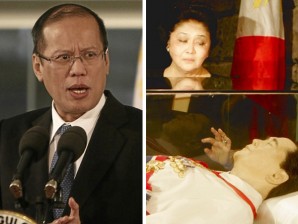
President Benigno Aquino (left) says there will be no state funeral or any kind of state honors for the late Ferdinand Marcos whose remains lie in an airconditioned glass case in Batac, Ilocos Norte. PHOTOS BY EDWIN BACASMAS, INQUIRER AND AP
A senior Catholic prelate on Thursday found fault with President Benigno Aquino III’s belated announcement of his position on the issue of a hero’s burial for the late dictator Ferdinand Marcos.
“He has no clear or definite stand. Before that announcement, he was rather vague. He was neither here nor there. All of a sudden when the foreign correspondents interviewed him his true conviction came out, that he was 100 percent certain that burial at the Libingan ng mga Bayani was out of the question,” said retired Lingayen-Dagupan Archbishop Oscar Cruz.
After earlier declining to decide on the issue despite promising during his presidential campaign that there would be no state honors for the late dictator, Mr. Aquino told a Foreign Correspondents Association of the Philippines (Focap) forum on Wednesday that he would not sanction a hero’s burial for Marcos.
“He failed to act presidential because he chose to announce it to foreign journalists. I don’t feel that [should be] for foreign media consumption,” said Cruz.
“If that has been his stand from the very beginning, how come he allowed Vice President Jejomar Binay to talk to the family in order to reach [a deal on the] burial issue,” he added.
Last February, after the Marcos family and their allies revived calls for a Libingan burial, Mr. Aquino ordered Binay to study the proposal. The latter launched a survey by text and e-mail and subsequently recommended that Marcos be buried in his native Ilocos Norte with full military honors.
Cruz recalled that Binay even spoke with the Marcos family which later withdrew their insistence that Marcos be buried at the Libingan and agreed on an Ilocos burial with state honors.
The prelate said he was leaving it to the next leaders of the country to decide how to settle the Marcos burial issue.
“I’m certain that in due time, after he [Mr. Aquino] leaves office, there will be another president that might allow the burial to take place,” he said.
No closure
Though it came a bit late for them, Marcos’ rights abuse victims hailed Mr. Aquino’s decision, saying it was a crucial step to putting closure on the issue.
“He should have made that position much earlier and avoided perception of hemming and hawing. But for us, martial law victims, it’s still welcome,” said Satur Ocampo, a former party-list House member who was detained during martial law.
“Finally, he has spoken. Personally, what the President is saying sounds pretty good to victims of martial law like us,” said Marie Hilao-Enriquez, chairperson of the human rights group Karapatan and a rights abuse victim.
Commission on Human Rights chairperson Loretta Ann Rosales, another human rights victim, said the President’s decision “hammered the last nail” on a debate that has raged for over 20 years.
“His decision reflects his position on the truth of history against the lies of the Marcos years. This is for a common good. It’s not only for human rights victims. Even the young generation will benefit from the truth on the history of the Marcos years, and that is what counts,” Rosales said in a message from South Korea.
Commenting on Senator Ferdinand Marcos Jr.’s angry remark that Mr. Aquino lost an opportunity to unify the country, Ocampo said the country’s unification would come from the Marcoses’ acknowledgement of their crimes against the Filipino people.
“He’s implying that the Marcoses have a large constituency. That’s off-key,” he said.
House Speaker Feliciano Belmonte Jr. on Thursday urged the people to just respect the President’s decision.
“At the end of the day, he’s the one who will decide that and he has made his decision,” Belmonte said.
He said the President merely wanted to consider other alternatives when he asked Binay to assess the sentiment of the people on the Marcos burial issue.
Party-list Representative Teodoro Casiño (Bayan Muna) praised Mr. Aquino’s stand.
“It would indeed be a travesty of justice if Marcos is buried with honors while thousands of his victims are still reeling from the damage he wrought on their lives,” Casiño said.
“They [the Marcos family] have yet to apologize to the nation and indemnify the victims of martial law,” he said.
Malacañang, meanwhile, said the Marcos family should acknowledge the human rights abuses of the Marcos regime, saying it was one of the considerations that the President took when he made the decision.
“The Marcos family to this day refuses to apologize and to this day they claim that there were no human rights violations,” said Presidential spokesperson Edwin Lacierda.
Commenting on Senator Marcos’ remark that Mr. Aquino had disregarded Binay’s recommendation, Lacierda said the Binay recommendation remained a recommendation until acted upon by the President. With Cynthia D. Balana and Norman Bordadora